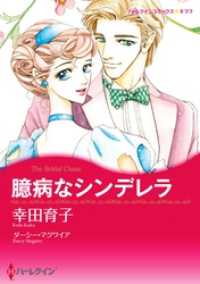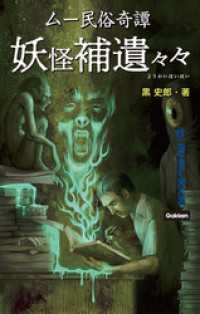- ホーム
- > 洋書
- > 英文書
- > History / World
基本説明
New in paperback. Hardcover was published in 1986.
Full Description
This volume studies the concept of a political 'language', of a discourse composed of shared vocabularies, idioms and rhetorical strategies, which has been widely influential on recent work in the history of political thought. The collection brings together a number of essays by a distinguished group of international scholars, on the four dominant languages in use in Europe between the end of the fourteenth and the beginning of the nineteenth century. They are: the language of political Aristotelianism and the natural law; the language of classical republicanism; the language of commerce and the commercial society; and the language of a science of politics. Each author has chosen a single aspect of his or her language, sometimes the work of a single author, in one case the history of a single team, and shown how it determined the shape and development of that language, and the extent to which each language was a response to the challenge of other modes of discourse.
Contents
Acknowledgements; Introduction Anthony Pagden; 1. The concept of a language and the métier d'historien: some considerations on practice J. G. A. Pocock; Part I: 2. The history of the word politicus in early-modern Europe Nicolai Rubinstein; 3. Civil science in the Renaissance: the problem of interpretation Donald Kelley; 4. Dispossessing the barbarian: the language of Spanish Thomism and the debate over the property rights of the American Indians Anthony Pagden; 5. The 'modern' theory of natural law Richard Tuck; Part II: 6. Sir Thomas More's Utopia and the language of Renaissance humanism Quentin Skinner; 7. The concept of ordre and the language of classical republicanism in Jean-Jacques Rousseau Maurizio Viroli; 8. The language of seventeenth-century republicanism in the United Provinces: Dutch or European? Eco Haitma Mulier; 9. The civil religion of James Harrington Mark Goldie; Part III: 10. Liberty, luxury and the pursuit of happiness M. M. Goldsmith; 11. The language of sociability and commerce: Samuel Pufendorf and the theoretical foundations of the 'Four-Stages Theory' Istvan Hont; 12. 'Da metafisico a mercatante': Antonio Genovesi and the development of a new language of commerce in eighteenth-century Naples Richard Bellamy; Part IV: 13. The criticism of rhetorical historiography and the ideal of scientific method: history, nature and science in the political language of Thomas Hobbes Gigliola Rossini; 14. Saint-Simon and the passage from political to social science Robert Wokler; 15. Alexander Hamilton and the language of political science Judith N. Shklar; Index.
-

- 電子書籍
- 臆病なシンデレラ【分冊】 7巻 ハーレ…
-

- 電子書籍
- ムー民俗奇譚 妖怪補遺々々



